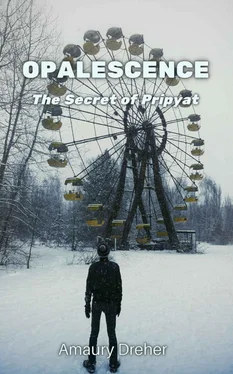Amaury Dreher - Opalescence - The Secret of Pripyat
Здесь есть возможность читать онлайн «Amaury Dreher - Opalescence - The Secret of Pripyat» весь текст электронной книги совершенно бесплатно (целиком полную версию без сокращений). В некоторых случаях можно слушать аудио, скачать через торрент в формате fb2 и присутствует краткое содержание. Год выпуска: 2019, ISBN: 2019, Жанр: Триллер, на английском языке. Описание произведения, (предисловие) а так же отзывы посетителей доступны на портале библиотеки ЛибКат.
- Название:Opalescence: The Secret of Pripyat
- Автор:
- Жанр:
- Год:2019
- ISBN:978-1-7134-1411-7
- Рейтинг книги:4 / 5. Голосов: 1
-
Избранное:Добавить в избранное
- Отзывы:
-
Ваша оценка:
- 80
- 1
- 2
- 3
- 4
- 5
Opalescence: The Secret of Pripyat: краткое содержание, описание и аннотация
Предлагаем к чтению аннотацию, описание, краткое содержание или предисловие (зависит от того, что написал сам автор книги «Opalescence: The Secret of Pripyat»). Если вы не нашли необходимую информацию о книге — напишите в комментариях, мы постараемся отыскать её.
Opalescence: The Secret of Pripyat — читать онлайн бесплатно полную книгу (весь текст) целиком
Ниже представлен текст книги, разбитый по страницам. Система сохранения места последней прочитанной страницы, позволяет с удобством читать онлайн бесплатно книгу «Opalescence: The Secret of Pripyat», без необходимости каждый раз заново искать на чём Вы остановились. Поставьте закладку, и сможете в любой момент перейти на страницу, на которой закончили чтение.
Интервал:
Закладка:
I felt my face being sprayed with boiling water. I finally regained consciousness. When I opened my eyes, I was inside a small wooden house, with only two rooms and almost no furniture. A Babushka was facing me, hands on her hips, a scarf on her head. She looked both reassured and mocking. Without any warning, she literally slapped me to disengage me and brought me a dirty glass filled with a dubious liquid: “Drink this, poor man!”
Thirsty and confused, I did so without protest. The unidentified liquid spread down my throat and then into my esophagus, burning everything in its path. “Take another one, it can’t hurt you!”
I complied again. The drink was unknown, but effective. The alcohol was spreading through my body, creating a comforting, though a little too intense, warmth in me.
I noticed that my bag was carefully placed against the wall. I thought I had lost him in the water… Was I lucid?
The Babushka was watching me, her forehead wrinkled. Her features were extremely drawn and her face looked rough, but she smiled. She seemed delighted to have a host. As soon as she saw me shaking my eyelids, she started making herbal teas and many slices of bacon. My imperfect Ukrainian and his very heavy accent made communication difficult. However, I hung on, eager to know more. The Babushka was called Yaroslava. She told me about her life, detailing the daily life in the Soviet Union, the Chernobyl accident, her late husband, the subsistence there and the vegetable garden. The events of 1986 were still intact in her weakened memory. She told me about the forced evacuation and her stubborn refusal to obey it. Like her, about 1200 people had chosen to return, sneaking through the barbed wire in defiance of government bans. The alternative housing granted was not worth their wooden houses, their plots of land, their homes.
“A lot of people thought we were crazy. The people of Kiev couldn’t understand why we wanted to stay. Some considered us only as inhabitants of Chernobyl, more as full-fledged Ukrainians. My grandchildren are almost forced to hide their origins or they are overwhelmed with questions and comments of all kinds. But I don’t regret anything in the world for coming back. This is my home,” she said proudly.
The Babushkas were in their forties at the time of the disaster. They had chosen to defy rationality by returning to live in the most toxic place on earth; a space where soil, air and water would be contaminated for tens of thousands of years. A space that had seen them born, grow and age. This territory that they cherished so much would be their last resting place. Radiation frightened them less than famine, with the Holodomor and the Second World War still haunting the collective memory.
The Babushkas ensured their survival by growing vegetables and picking mushrooms. Some even hunted. Others, like my benefactor, handled the axe perfectly, despite her 83 years of age. The power of the household, the refusal to abandon their homes and the attachment to their native lands kept them alive.
She showed me a clipping from a 1997 press article. Yaroslava and her husband proudly appeared in the photo accompanying the text, smiling and with a wheelbarrow on their arms. “In the 1990s, many photographers and journalists came to visit us. My husband was still alive at that time, he could help me with the garden,” she explained.
The Babushkas came from these villages, they knew the Zone better than anyone else, they had been there since their birth. Most of them lived in Kupovatoe, a small and quite large hamlet in the Zone. Today, they are only a handful, benefiting from humanitarian aid, and sometimes receiving visits from soldiers or even tourists. Faced with their visceral obstinacy, the Ukrainian government had abandoned the idea of dislodging them and was now content to provide them with occasional medical assistance so that they could end their lives with dignity.
“The Zone had regained a very ordinary pace of life. We sowed the fields and ploughed with the same vigour as before. Some of us felt invigorated by overcoming the evacuations. After all, we had taken our destiny into our own hands. We had stayed. We were stronger than the others. We were not afraid of the setbacks of science. Radioactivity or not, we would never abandon our land. Autumns passed, winters extended and we savoured our decision. We were aware that we were individuals apart, forgotten. Politicians don’t care about us, they have a lot of other worries anyway.”
She did not seem to ignore the revolutionary events of 2014. She told me about her family, her cousin who left for the Soviet Navy at the age of 18. He had been stationed in Sevastopol in the Crimea, but had died long before the annexation. His children now lived not far from Odessa.
“They have a very different daily life from ours. Here, we fight every day for our survival. But I’m not complaining. I chose to come back, that’s where I belong. Sometimes I think about what my life would have been like if I had run away. Life in Ukraine today is really difficult, but it was much worse 50 years ago.”
The Holodomor and the war had decimated the population. The trauma was still present and inspired many popular songs. Her grandchildren did not know the Soviet Union. This troubled period had dissolved before they were born. The fall of the USSR had raised hopes for a profound change in Ukrainian society and an improvement in living conditions. She explained to me that little had really changed, at least to the extent of the expectations that had been raised: “People are still poor, corruption is omnipresent and great Russia is watching fiercely!”
When asked if she had already left the Zone, Yaroslava laughed and coughed: “What for? There’s nothing for me outside. And then, who would feed the dogs, who would take care of the vegetable garden? No and no, I’m staying here. That’s where I belong.”
The comfort of the house was rudimentary, but it was rather well maintained. A picture of her daughter’s wedding was hanging over the fireplace.
The hearth was bright red, almost hypnotic. The Babushka mastered the secrets of fire better than I did. I was impressed by her autonomy and resourcefulness. She told me that every morning she was busy extracting water from the well. A practice, of course, not recommended by the authorities, but it was slipping away. She made the same tireless movements, pressing the valve to fill her small scrap bucket. Her children had bought her an electric kettle, which was plugged into the only outlet in the house. Various multicoloured embroideries and orthodox icons adorned the different shelves.
Yaroslava explained to me that once a year, she and the others were entitled to a visit to the church of Ivankiv, located about forty kilometres from her village. Buses were specially chartered. It was every year, a real expedition, a moment they all looked forward to, as a reward for their survival. They could pray and meet the pope, a rebel too. The church had been renovated and had nothing to envy to some city buildings. All these joyful individuals formed a rather original community and gathered to light candles and celebrate Orthodox festivities. These octogenarians were a small self-sufficient survivor in the space considered to be one of the most dangerous in the world.
The vast majority of Babushkas live alone, their husbands having died. Their social relationships are therefore restricted to the few individuals who venture there and to other Babushkas living nearby. Some of them have a family living outside the Zone. Sometimes they were fortunate enough to have their grandchildren visit them. Not everyone was so lucky. But they did not complain, stating that they were even happier than those who accepted the evacuation.
“Babushka is no longer young. The survivors are dropping like flies. One after the other, they left. The men left long before we did. I wish to take my last breath here, not in a concrete hospital outside. My children are almost gone. I just hope they will take care of burying me in my garden… Government visits are also becoming more and more rare. They’re barely giving us any more money. Not so long ago, scientists came here. They took eggs and water from the well. They shipped their samples to a laboratory in Kiev. If it can help them…
Читать дальшеИнтервал:
Закладка:
Похожие книги на «Opalescence: The Secret of Pripyat»
Представляем Вашему вниманию похожие книги на «Opalescence: The Secret of Pripyat» списком для выбора. Мы отобрали схожую по названию и смыслу литературу в надежде предоставить читателям больше вариантов отыскать новые, интересные, ещё непрочитанные произведения.
Обсуждение, отзывы о книге «Opalescence: The Secret of Pripyat» и просто собственные мнения читателей. Оставьте ваши комментарии, напишите, что Вы думаете о произведении, его смысле или главных героях. Укажите что конкретно понравилось, а что нет, и почему Вы так считаете.












